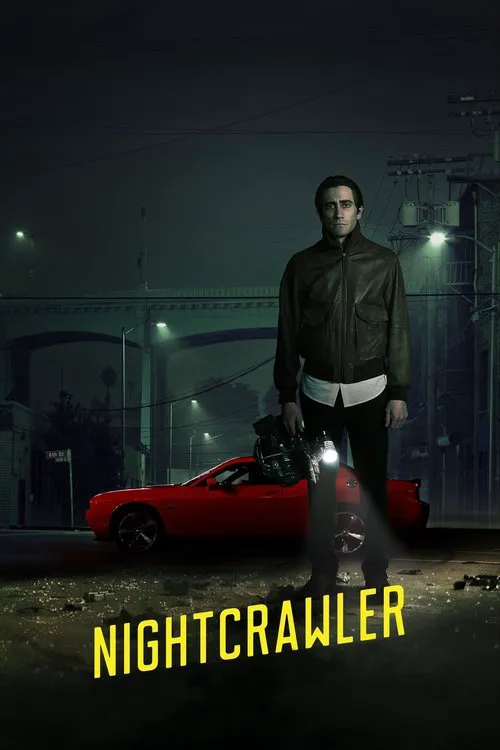Nightcrawler

Plot
In the city of Los Angeles, where the perpetual night casts a veil over the concrete jungle, the character of Lou Bloom emerges. He is played by Jake Gyllenhaal, and the film follows his journey into the world of crime journalism. Lou is desperate for work, and the lack of it drives him to seek out unconventional means of employment. At a red-light intersection, Lou observes a gruesome hit-and-run incident. As he witnesses the commotion that follows, an idea takes hold of him. Seizing an opportunity that few would dare to consider, Lou decides to become a crime journalist, capturing the sensational on camera. He invests in a camera and a rundown car, outfitting himself for the demanding job that lies ahead. With his new occupation in mind, Lou discovers a sense of authority and control that had been eluding him in the past. The more accidents and crimes he documents, the more he begins to crave, feeling an intoxicating rush as the events he records send shockwaves through the city. During his search for work, Lou visits a local news station where he meets Nina Romina, a veteran journalist who serves as the station's assignment editor. She is played by Rene Russo, and in Nina, Lou finds guidance and a measure of connection that only a handful of characters possess. However, it becomes apparent that Lou's methods are as insidious as they are exceptional. He poses in the backdrop of the stations office when he is not asked to vacate the area, which suggests that he is insatiably obsessed with his job and desperate to hold onto the roles and connections it supplies. As Lou digs his feet deeper in the world of crime journalism, a series of gruesome and high-profile incidents unfolds, with him there to document every minute. His body cam- footage captures everything from drive-bys to high-speed chases and fatal car accidents. This is done despite such incidents possibly presenting other dangers that are worth addressing. The drive to report in such a dark fashion raises several questions about the role of journalism, the ethics involved in capturing crime, and what happens to individuals who obsess over the wrongdoings of others. He continuously blurs the line between observer and participant. Wherever a particular situation exists that has been reported, Lou can be noticed lingering nearby; the tension between witnessing and influencing grows ever more unstable. Further into the story, it's revealed that Joe Loder, an older and experienced nightcrawler, begins to notice Lou's persistent appearances and his inclination to find the most violent and impactful events. As a result of this new rivalry, a disconcerting and dangerous game of one-upmanship begins between the two, where each nightcrawler is hell-bent on capturing the most horrific and unapologetic footage, but at a peculiar price – their humanity. This series of events raises a multitude of issues surrounding the purpose and price of journalism. On one hand, is it morally justifiable for reporters to prioritize ratings and sensational content over human dignity and decency, or does the pursuit of information justify the potentially hazardous cost of reporting it? As Lou's reputation grows within the news world, so does his sense of justification for his actions. Desperate to be taken seriously as a legitimate journalist, he starts to define crime based on the visual content that is captured – indicating an unsettling merging of our perceptions of ethics and sensationalism. The once-abstract concept of truth now intersects with gratification and entertainment. When this disquieting convergence is probed, does it illuminate deeper truths, or hide a facade behind crime? As the climax unfolds, we find ourselves facing a jarring interpretation of the job that Lou has created for himself. This disintegration of the truth from crime reporting turns out a world where innocence and tragedy has been warped by aesthetics and viewing angles. While struggling to come to terms with an ill sense of accomplishment, the darkness of L.A. city still lingers - but within it lies a thought-provoking critique on the darker aspects of journalism, crime reporting, and the chaos that exists under Los Angeles' midnight sky.
Reviews
Recommendations




